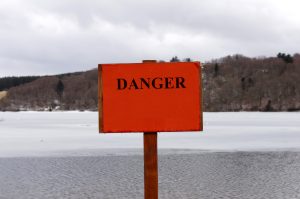Are you wondering, ‘Can I claim if I’ve slipped on ice in public?’. You may be asking this question if you suffered an injury in a fall because ice was not removed or you were not prewarned of the slippery surface. To answer this question, our guide will examine all the aspects of making a valid personal injury claim after falling on ice or snow. Starting with who is eligible to claim compensation and what defines an accident in a public place caused by negligence.
We move on to looking at compensation and how amounts can be calculated that reflect all the ways you were harmed. We look at the evidence that can support your slipped-on-ice claim as well as the time limits that apply to launching a compensation case. In the final sections, we look at No Win No Fee agreements and explain the advantages of instructing a solicitor to help you.

At Personal Injury Claims UK, we offer a free case check to callers. If the team finds that you have solid grounds to seek damages from a third party who failed to safeguard against hazardous ice, they can connect you to a solicitor from our panel. You could access excellent legal support in one phone call. Our team is available 24/7:
- Call us on 020 8050 2736
- Contact us by filling out our online form.
Jump To A Section
- Can I Claim If I’ve Slipped On Ice In Public?
- How To Prove Slipping On Ice Was Caused By Negligence
- How Much Compensation Can I Claim If I’ve Slipped On Ice In Public?
- Is There A Time Limit When Claiming For A Slip And Fall On Ice In A Public Place?
- Claim Slip On Ice Compensation On A No Win No Fee Basis
- Read More About Claiming After Falling On Ice
Can I Claim If I’ve Slipped On Ice In Public?
Slipping on ice in a public place can cause serious injury. The fall caused by failure to grit or salt icy surfaces or alert the public to the risk may cause fractured or broken bones or leave deep cuts and lacerations. It can also be possible to suffer a serious spinal or head injury caused by snow and ice on a pavement accident. Shops, restaurants and supermarket owners, as well as a local authority or council, are all considered as occupiers.
An occupier has a duty of care to take steps to ensure the reasonable safety of those visiting the space for its intended purpose. The general requirements are set out in legislation called the Occupiers’ Liability Act 1957.
Occupiers should risk assess hazardous weather, such as ice and snow, and take the necessary measures to keep any visitors reasonably safe. Because weather is unpredictable, there are limits to what an occupier can do to prevent all ice hazards.
The valid grounds for launching a public liability claim must start by showing that negligence occurred. In tort law, three points determine this:
- A third party owed you a duty of care.
- They breached this duty of care.
- As a result, you sustained injuries.
All three points need to apply to have a valid claim if you’ve slipped on ice in public. If you feel that ice and snow were not treated as a hazard and led to you slipping and suffering injury, get in touch to see if you could get help with a public liability claim.
How To Prove Slipping On Ice Was Caused By Negligence
An experienced personal injury solicitor can support you through every stage of the claims process. One area in which their advice is perhaps most helpful is collecting evidence for a personal injury claim. Because of their decades of experience, they can alert you to proof which can strengthen your case, such as:
- Collecting any available CCTV footage from that area.
- Taking photos that show the ice or lack of warning.
- Medical evidence that substantiates your claim of injury and medical treatment you received.
- Statements from witnesses.
It is important to note that you could still have a valid claim without all of the items listed above. If you’d like to find out more about how expert guidance could help you collect evidence for your potential claim, please call for free on the number above.
How Much Compensation Can I Claim If I’ve Slipped On Ice In Public?
Awards can apply in two areas if the claim is a success. General damages compensate claimants for the physical and/or psychological suffering and pain caused by the injuries. Those tasked with applying a value to general damages can look at available medical evidence to guide these calculations.
You may also be invited to attend a medical assessment with an independent medical professional. They will provide a report on how you have suffered, how your quality of life has and will be affected and a prognosis. Their findings can be used to apply a general damages value.
The medical assessment is then compared with injuries listed in publications like the Judicial College Guidelines (JCG). This document lists guideline award bracket amounts for various injuries and severities. The excerpt shows:
Compensation Guidelines
| Area of Injury | Notes | Severity | Award Bracket Amount |
|---|---|---|---|
| Multiple Very Severe Injuries and Special Damages | Cases of severe multiple injury and associated special damages for loss of earnings and care costs. | Very Severe | Up to £1 million plus. |
| Back | Severe injuries to spinal cord and nerve roots that create incomplete paralysis and bladder/bowel impairment. | (a) Severe (i) | £91,090 to £160,980 |
| Back | Cases of compression/crush fractures in the lumbar vertebrae leaving significant risk of constant pain and osteoarthritis. | (b) Moderate (i) | £27,760 to £38,780 |
| Back | Full recovery or to a nuisance level takes place with no need for surgery with 2 - 5 years. | (c) Minor (i) | £7,890 to £12,510 |
| Head | Cases of moderate to severe intellectual deficit and issues such as personality change, or impact on senses. Damage to employment prospects. | (c) Moderate (i) | £150,110 to £219,070 |
| Shoulder | Dislocations and damage to the lower area of the brachial plexus resulting in pain and aching in the shoulder and neck as well as restricted movement. | (b) Serious | £12,770 to £19,200 |
| Knee | Serious injuries to the knee that disrupt the joint and cause the development of osteoarthritis. Also cases of gross ligament damage that requires a prolonged recovery period. | (a) Severe (i) | £69,730 to £96,210 |
| Wrist | Injuries that cause a total loss of function in the wrist even after corrective surgery. | (a) Loss of Function | £47,620 to £59,860 |
| Ankle | Injuries that require a prolonged period in plaster or where surgical pins needed to be inserted. Increased risk of osteoarthritis as well as issues such as sleep disturbance and scarring. | (b) Severe | £31,310 to £50,060 |
| Elbow | Injuries that cause impaired function but not involving major surgery or significant disability. | (b) Less Severe Injury | £15,650 to £32,010 |
It is very important to note that the figures in the JCG are guidelines only. They are not to be read as compensation guarantees, as each claim will differ according to individual circumstances. Also, the first line in our table is not from the JCG.
Claiming Financial Losses After Slip And Falls On Ice
As part of a successful injury claim after slipping on ice, you could also receive an award under special damages. This head of loss aims to reimburse you for the financial harm caused by the accident and injury.
For example, you may have been unable to work which created a loss in income. Or perhaps you were presented with medical expenses for rehabilitation costs not available through the NHS. To include a claim for special damages, you need to present documented proof of these losses. This can be:
- Payslips that show a loss in past or predicted earnings.
- Travel expenses to essential appointments.
- Care costs for help at home from family, friends or paid carers.
- Medical costs.
- Housing adaptations.
With this in mind, it is important to retain all documented proof of out-of-pocket costs. To find out how much compensation you can claim if you slipped on ice in public or for more information on any aspect of the public liability claims process after slipping on ice or snow and being injured, speak to our team.
Is There A Time Limit When Claiming For A Slip And Fall On Ice In A Public Place?
Under the Limitation Act 1980, a personal injury claim time limit applies of 3 years. This usually starts from the date of the accident.
Some exceptions can apply to this time limit. For example, if the injured person does not have the mental capacity to make a claim independently or is under 18, they cannot claim for themselves. This means that the time limit is paused, and a litigation friend can be appointed by the courts to handle the claim.
If no claim is made on their behalf while the time limit is paused and their mental capacity returns or they turn 18 the three-year time limit would start from that date.
Please get in touch for any questions about time limits to claim if you’ve slipped on ice in public or to see if personal injury lawyers could be appointed to represent you in your claim.
Claim Slip On Ice Compensation On A No Win No Fee Basis
If you’ve slipped on ice in public and would like to make a claim with a public liability solicitor, then give our advisors a call today for a free consultation. They will assess the merits of your claim and advise on whether you have strong grounds to pursue slipped-on-ice compensation.
Should you have a valid personal injury claim they can connect you to an expert public liability claim solicitor from our panel who could agree to represent you through a No Win No Fee contract called a Conditional Fee Agreement (CFA). Usually, the terms of a CFA mean:
- You are not required to pay upfront or ongoing fees for your solicitor’s services.
- A success fee can be agreed between you and your solicitor at the start of the claim.
- You won’t pay fees for solicitors’ services should your claim be unsuccessful.
- Finally, in a successful outcome, the solicitor only deducts a legally capped success fee percentage from the payout.
Typically, solicitors offering a CFA only take up a No Win No Fee claim that has a good chance of success. If you think this is of interest to you, the first step is to speak to an advisor. You can begin by:
- Calling us on 020 8050 2736
- Or why not contact us by filling out our online form?
Read More About Claiming After Falling On Ice
Thank you for reading our guide. We hope it has helped answer the question, ‘Can I claim if I’ve slipped on ice in public?’. You may find these other articles from our website useful:
- This guide looks at compensation for a black ice car accident claim.
- Here we explore slip, trip and fall ice compensation claims.
- Also, public liability claims against the council for personal injury are looked at here.
Also, please find some useful external resources:
- The NHS has guidance on giving first aid, which you can find here.
- Learn more about claiming statutory sick pay from this Government page.
- This Gov.UK link explains how to request CCTV footage of yourself.



